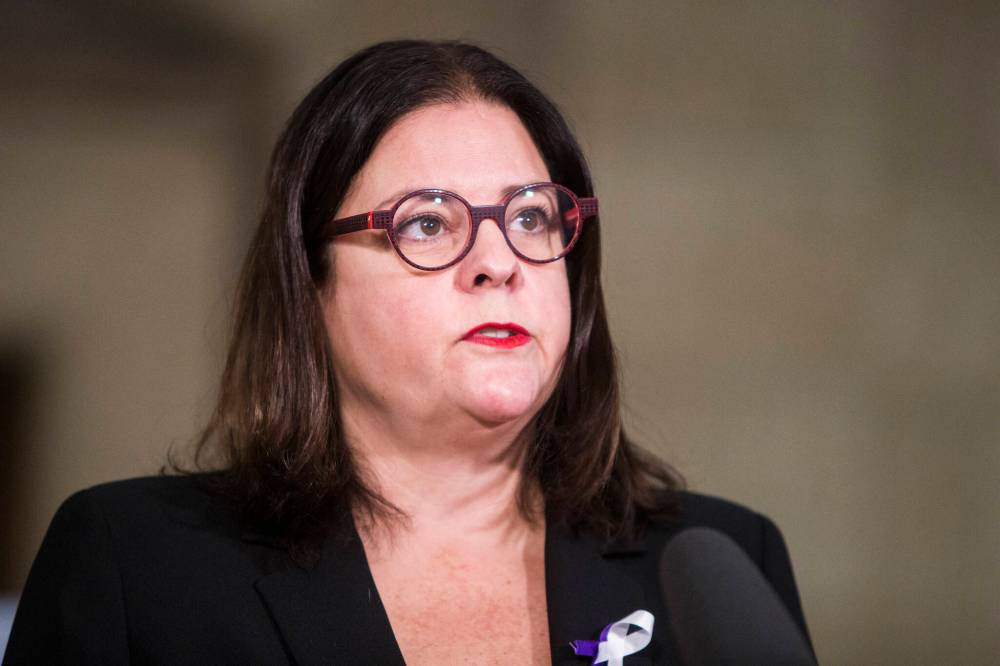Stefanson can, should help battered businesses, non-profits
Advertisement
Read this article for free:
or
Already have an account? Log in here »
To continue reading, please subscribe:
Monthly Digital Subscription
$0 for the first 4 weeks*
- Enjoy unlimited reading on winnipegfreepress.com
- Read the E-Edition, our digital replica newspaper
- Access News Break, our award-winning app
- Play interactive puzzles
*No charge for 4 weeks then price increases to the regular rate of $19.00 plus GST every four weeks. Offer available to new and qualified returning subscribers only. Cancel any time.
Monthly Digital Subscription
$4.75/week*
- Enjoy unlimited reading on winnipegfreepress.com
- Read the E-Edition, our digital replica newspaper
- Access News Break, our award-winning app
- Play interactive puzzles
*Billed as $19 plus GST every four weeks. Cancel any time.
To continue reading, please subscribe:
Add Free Press access to your Brandon Sun subscription for only an additional
$1 for the first 4 weeks*
*Your next subscription payment will increase by $1.00 and you will be charged $16.99 plus GST for four weeks. After four weeks, your payment will increase to $23.99 plus GST every four weeks.
Read unlimited articles for free today:
or
Already have an account? Log in here »
Hey there, time traveller!
This article was published 21/12/2021 (1448 days ago), so information in it may no longer be current.
Few groups in society have faced economic hardship during the pandemic the way small and medium-sized businesses have.
Public-health restrictions that repeatedly closed businesses or limited their operations were necessary to mitigate death and severe illness. The restrictions worked: infection rates and hospitalizations fell dramatically every time they were imposed.
However, those measures came at a great economic cost, mostly to small businesses and not-for-profits. They paid a disproportionate price — a sacrifice for which they’ve never been adequately compensated.

Some have gone bankrupt and others have survived by drawing down savings and racking up debt.
Close to two-thirds of small businesses across Canada have not seen sales return to normal levels, according to surveys conducted by the Canadian Federation of Independent Business. Average debt taken on during the pandemic for small business was $170,000 by the end of August ($333,174 for businesses in the hospitality sector), according to the CFIB.
Government assistance has helped, including wage and rent subsidies, largely from the federal government. The Manitoba government provided some assistance, including through its Bridge Grant program ($5,000 taxable income grants). Considering the magnitude of the financial hardship, including to mom-and-pop operations that invested life savings into their businesses, the provincial support was a pittance. When pressed on it before he stepped down as premier, Brian Pallister usually downplayed the hardship small business faced, arguing they weren’t the only ones hurting during the pandemic. He said the provincial treasury wasn’t large enough to adequately compensate them all.
“We’re not going to reopen all the small businesses just because somebody’s yelling about it,” Pallister said a year ago.
So just let them die with little to no compensation? It hardly seems fair, especially when society as a whole benefits from the restrictions.
Manitoba has a new premier. Perhaps Heather Stefanson can see more clearly than her predecessor the inequities small businesses and not-for-profits face. If she does, now is the time — with a fresh round of restrictions imposed on businesses Tuesday — to demonstrate it.
Finance Minister Scott Fielding is expected to make an announcement Wednesday on more financial help for business. That’s good news, but it needs to be more than another round of $5,000 Bridge Grants, or some similar level of support.
The government has the money to do it. Its net income is nearly a half-billion dollars higher than projected for the 2021-2022 fiscal year, according to the province’s mid-year financial report released last week.
Income tax revenue is $403 million above budget and corporation income tax is $77 million higher than projected. Add in $208 million in extra COVID-19 cash from Ottawa, factor in other revenue lines — some of which fell — and the province’s income is $489 million higher than projected.
Being the good money managers they are, the Tories have spent hardly any of that: net expenditures are only $15 million above budget (spending went up in some departments, including in health care, and fell below budget in others).
In a non-pandemic year when government is trying to reduce the deficit, hanging on to that extra revenue to help balance the books might be prudent. But these are not normal times.
There is no need during a public health crisis to reduce the provincial deficit faster than previously planned, not when government is imposing fresh restrictions on businesses and not-for-profits.
Government’s debt-to-GDP ratio, one of the key indicators credit-rating agencies consider when evaluating government finances, is projected to fall nearly four percentage points below what was forecast this year, to 36.1 per cent. That’s approaching pre-pandemic debt levels (debt-to-GDP was 34.2 per cent prior to the pandemic). Even though the province is projecting a $1.1-billion deficit (well below the $1.6-billion budgeted shortfall), the province has the fiscal room to provide businesses and not-for-profits affected by the latest restrictions with significant financial assistance.
As taxpayers, we owe it to them. We all benefit from the measures and we should all pay for the collateral damage they cause. It’s the right and fair thing to do.
tom.brodbeck@freepress.mb.ca

Tom has been covering Manitoba politics since the early 1990s and joined the Winnipeg Free Press news team in 2019.
Our newsroom depends on a growing audience of readers to power our journalism. If you are not a paid reader, please consider becoming a subscriber.
Our newsroom depends on its audience of readers to power our journalism. Thank you for your support.







